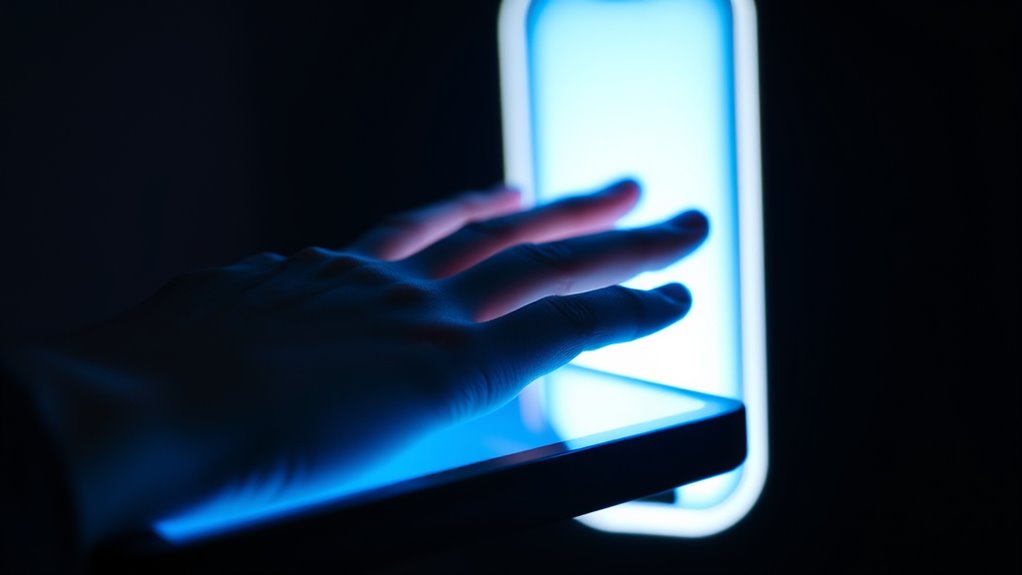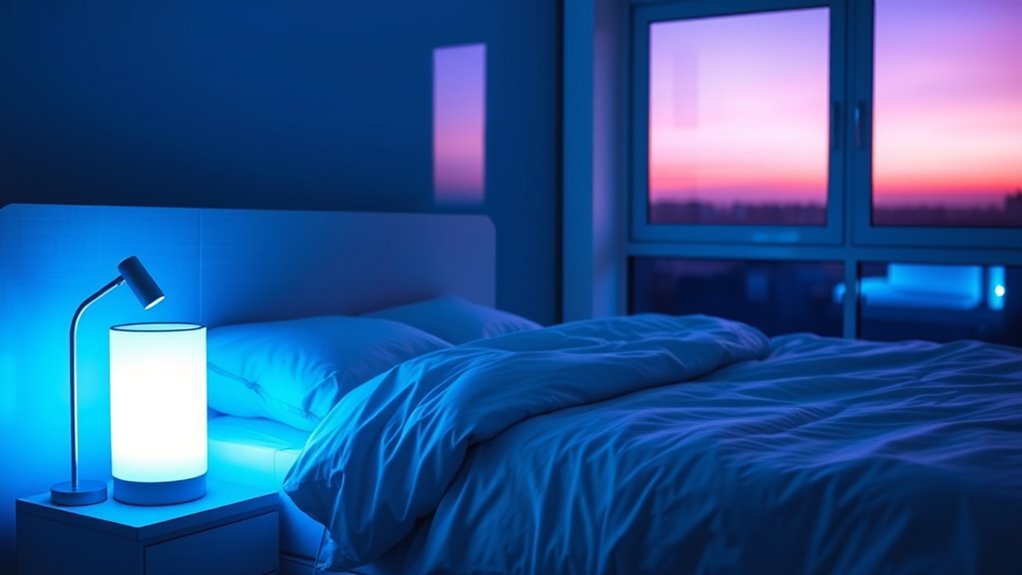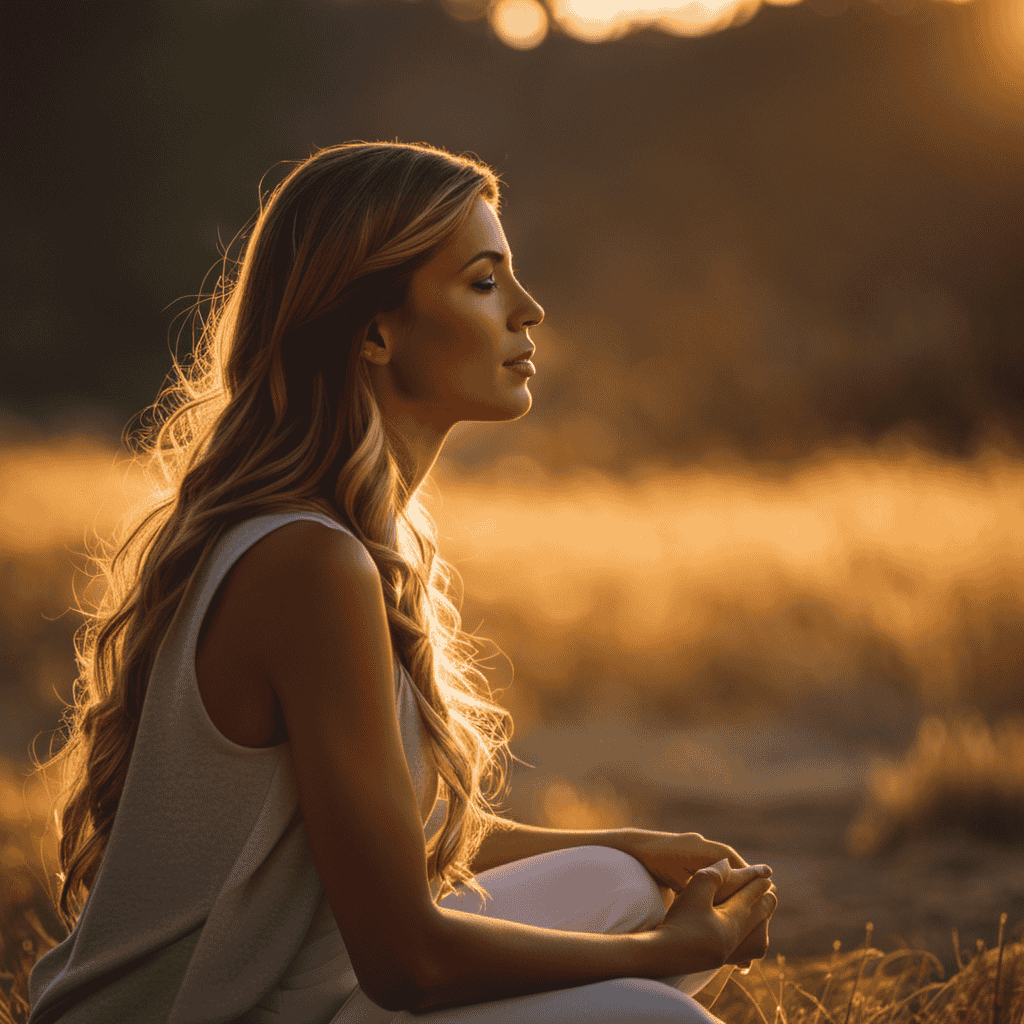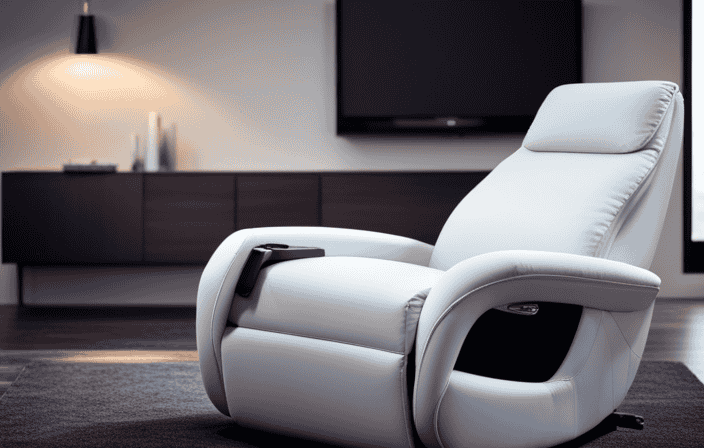By timing your blue light exposure to match natural daylight, you can boost your circadian rhythm’s health. During daytime, natural blue light keeps you alert and helps keep your sleep cycle synchronized. In the evening, reduce blue light exposure from screens to let melatonin rise, signaling your body it’s time to sleep. Managing blue light this way can improve sleep quality and daytime alertness. Stay with us to discover effective strategies to optimize your light habits.
Key Takeaways
- Properly timed natural blue light exposure during the day reinforces your circadian rhythm and promotes alertness.
- Limiting blue light exposure in the evening allows melatonin production, signaling your body to prepare for sleep.
- Using blue light filters or glasses in the evening reduces circadian disruption and improves sleep quality.
- Aligning light exposure with natural day-night cycles helps maintain a healthy, synchronized circadian rhythm.
- Managing blue light timing enhances overall sleep, mood, and daytime alertness by supporting your body’s internal clock.

Have you ever wondered how the blue light from screens affects your sleep? It’s a common concern in today’s digital age, where smartphones, tablets, and computers are part of your daily routine. The impact of blue light on your circadian rhythm is important because it directly influences your body’s internal clock, which regulates sleep and wake cycles. When you’re exposed to blue light late in the evening, it can lead to melatonin suppression. Melatonin is the hormone responsible for signaling to your body that it’s time to wind down and prepare for sleep. By inhibiting its production, blue light makes it harder to fall asleep and reduces overall sleep quality. This disruption can leave you feeling groggy, less rested, and less alert during the day.
Blue light in the evening suppresses melatonin, making it harder to fall asleep and reducing sleep quality.
Understanding how blue light timing affects your circadian rhythm empowers you to make smarter choices about your screen habits. During the day, exposure to natural blue light helps keep your circadian rhythm aligned, promoting alertness and productivity. But as evening approaches, your body expects dimmer lighting that signals it’s time to relax. When you continue to expose yourself to blue light past sunset, you interfere with this natural changeover. The delayed production of melatonin not only makes falling asleep more difficult but also fragments your sleep throughout the night. Over time, this can lead to chronic sleep issues, affecting your overall health, mood, and cognitive function.
To optimize your sleep quality, it’s essential to manage blue light exposure based on the timing. Reducing screen time in the hour or two before bed can markedly improve melatonin levels and help your circadian rhythm stay on track. Using features like night mode or blue light filters on your devices cuts down on the harmful wavelengths that disrupt melatonin production. Wearing blue light blocking glasses in the evening is another effective strategy, especially if you need to use screens late at night. Additionally, establishing a relaxing pre-sleep routine that avoids screens altogether signals to your body that it’s time to wind down, reinforcing your natural circadian rhythm. Recognizing that blue light can also impact other aspects of AI Security highlights the importance of managing exposure in our increasingly digital world.
The timing of your blue light exposure isn’t just about avoiding screens at certain hours; it’s about respecting your body’s internal clock. When you align your light exposure with natural day-night cycles, you help your circadian rhythm stay synchronized. This alignment results in better sleep quality, improved mood, and increased daytime alertness. Making these small but intentional changes can transform your sleep health, helping you wake up feeling more refreshed and ready to face each day.
Frequently Asked Questions
Can Blue Light Exposure Improve Sleep Quality Long-Term?
Blue light therapy can help improve your sleep quality long-term if used correctly. It influences your circadian rhythm by regulating melatonin suppression, which affects your sleep-wake cycle. When exposed to blue light at appropriate times, you can strengthen your natural rhythm, making it easier to fall asleep and wake refreshed. However, overexposure or improper timing may disrupt melatonin production, so moderation and proper timing are key for lasting benefits.
What Are the Best Times to Avoid Blue Light at Night?
Did you know that exposure to blue light at night can reduce melatonin production by up to 23%? To protect your sleep, avoid evening screens at least 2-3 hours before bed. Instead, aim for morning sunlight to help reset your circadian rhythm. Limiting blue light in the evening allows your body to produce melatonin naturally, making it easier to fall asleep and wake refreshed.
Does Blue Light Affect Everyone Equally, Regardless of Age?
You might wonder if blue light affects everyone equally, but age-related differences and individual sensitivities play a big role. Younger people often have more sensitive circadian systems, making them more prone to disruption from blue light. Older adults may experience less impact. Your unique sensitivities mean that blue light can affect you differently depending on your age, lifestyle, and genetics, so it is crucial to pay attention to how it influences your sleep.
Are There Specific Devices That Block Blue Light Effectively?
Did you know that over 60% of people use devices before bed? You’ll find plenty of options, like blue light blocking glasses and screen filters, that effectively reduce blue light exposure. These tools can help you sleep better and protect your eyes. Look for glasses with high-quality lenses or screen filters that are easy to apply. Using them consistently makes a noticeable difference in your circadian health.
How Does Blue Light Impact Melatonin Production Differently Than Other Light Types?
Blue light impacts melatonin production more than other light types because of its specific light spectrum effects. You might notice melatonin suppression happening faster under blue light, especially at night, which can disrupt your sleep. Unlike red or softer lights, blue light directly influences the receptors in your eyes, signaling your brain to reduce melatonin, making it harder to fall asleep and affecting your overall circadian rhythm.
Conclusion
By adjusting when you get exposure to blue light, you can truly reset your internal clock and improve your sleep quality. Imagine waking up refreshed and energized, ready to face the day—doesn’t that make it worth paying attention to your blue light timing? Taking control of your circadian rhythm isn’t just about better sleep; it’s about transforming your overall well-being. So, why not start today and see how small changes can make a big difference?









